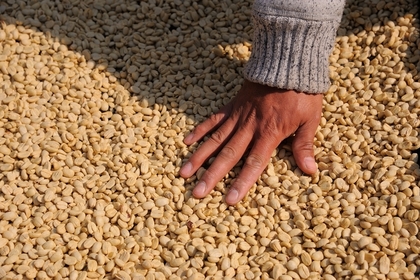Sidamo G 2 correctly drink Sidamo coffee bean price

For professional baristas, please follow the coffee workshop (Wechat official account cafe_style)
Sidamo G2 Washed
Country: Ethiopia
Grade: G2
Producing area: Sidamo
Baking degree: light baking
Treatment: washing
Variety: native species
Flavor: honey, citrus, lemon
Hand-washed Sidamo. 15g powder, medium fineness grinding (small Fuji ghost tooth cutter 3.5grinding), v60 filter cup, 91mi 93 degrees water temperature, first water injection 30g water, carry on steaming for 27 seconds, injection to 105g water cut off, wait for powder bed water to half, then water injection, slow water injection until 225g water volume, no water powder ratio at 1:15, extraction time at 2:00
Nowadays, there are more and more water washing plants in Ethiopia. Small farmers sell their coffee fruits to processing plants, peel them and resell them in the auction system, and then transfer them to the port of Assab in Eritrea in the Red Sea and the port of Djibouti in Djibouti near the Gulf of Aden. Although coffee is the country's main agricultural export, its own annual consumption is also astonishing, about 1500000bags/60kg. Accounted for 50% of the total generation. Wild coffee grows in the tropical rain forests of the southwestern plateau, and most of them are selected by hand, but because of this, many local people maliciously destroy the naturally formed rainforest areas-either felled or burned in order to reach the rugged mountains that are inaccessible. But it seriously affected the ecological balance. Whether the coffee is washed or sunburned, all exported coffee is sent to the capital, Addis Ababa, and the DIRE DAWA auction outlet in Hara province. The DIRE DAWA auction center usually exports sunburn halas in the area. Coffee information from different farms can be seen in the auction house every day to facilitate the acquisition of traders. Ethiopian officials also go in and out of the center every day to inspect and set grades. Each time a random sample of the same shipment of raw beans 3 kg inspection.
Today, there are still a large number of wild Arabica coffee trees growing in many parts of Ethiopia, averaging between 4200 and 6800 feet above sea level. Now there is a tendency to cultivate a small amount of them. Banana trees are generally planted for shade at the same time. However, due to the lack of agricultural technology, herbicides and pesticides are less used. Coffee is Ethiopia's main economic crop and the country's largest crop export and important industry. It accounts for 60% of Ethiopia's total export value and supports many small farms, as well as sugar, bananas and cotton. It is also Ethiopia's largest and important commodity export crop after oil, and it is also the largest export of Elaraby in Africa, with a total value of about US $300 million in 1997. in terms of total output, 94% are produced by small farms and 6% by government agencies. because many farms are scattered and grow other crops, it has been difficult to integrate the figures correctly. However, the country's official coffee cultivation area is at least 400000 hectares, and the Ethiopian government encourages local farmers to improve their quality and productivity so that coffee farmers can expand their business scale and increase production capacity and exports. During the harvest
The Sidamo producing area, which is 1400-2200 meters above sea level, is a famous boutique coffee area in southern Ethiopia, bordering Kenya. The washed Sidamo is light green, the beans are small, the growth is oval, the fruit is full, the average quality is good, the smell is fragrant and mellow, a drop of entrance, endless aftertaste, with wild beauty. The coffee flavor of Sidamo is very diverse, with different soil types, microclimate and countless native coffee species, which make the coffee produced in cities and towns have obvious differences and characteristics. In 2010, Murray 2012, it continuously obtained the high score of CR92--94, the authoritative coffee evaluation website in the United States. Thus it can be seen that the raw beans in this area are extraordinary. The territory has towering mountains, highlands, plateaus, valleys and plains, with diverse topography. The geology of the area belongs to fertile, well-drained volcanic soil with a depth of nearly two meters and a dark brown or brown surface soil. The biggest advantage of the area is that the soil fertility is maintained through the circulation of organic matter, using the withered leaves of the surrounding trees or the residual roots of the plants as fertilizer.
Unlike ordinary African coffee, Sidamo has clear acidity, smooth taste and delicate floral smell. Washing Sidamo is elegant and playful. The entrance is mild and pleasant, with a strong taste impact with the bright lemon acid later on. The palate is unique and mellow, with a chic and pleasant aftertaste. The slowly rising finish contains chic sweetness. Coffee raw beans are grayish in some places thick and small in some places, soft and strong acidity, mellow, sweet and spicy, and is one of the courtyard coffees in the highlands of southern Ethiopia.
Farmers harvest bright red fruit every day, and every two days the coffee fruit is sent as a unit or sold to a water washing plant for treatment. Coffee fruit without a water treatment plant is usually naturally fermented for about 12 hours, and then passed through the sun for drying and shelling. In any case, farmers always try their best to send them to the water treatment plant for treatment, so that they can sell at a better price under the name of "washing treatment". In the washing field, the coffee cherry softens the pulp after about 12 hours of soaking and fermentation, then passes through the waterway and stirs to separate the pulp from the coffee beans, and the pulp is discharged with the floodgates.
Factory name: coffee factory address: No. 10 Baoqian Street, Yuexiu District, Guangzhou City, contact: 020-38364473 shelf life: 90 net content: 227g packaging: raw and ripe coffee beans in bulk: whether coffee beans contain sugar: sugar-free origin: Ethiopia roasting degree: light roasting
Important Notice :
前街咖啡 FrontStreet Coffee has moved to new addredd:
FrontStreet Coffee Address: 315,Donghua East Road,GuangZhou
Tel:020 38364473
- Prev

Sidamo G 2 Flavor Description Sidamo Coffee Which brand is good
Professional barista exchanges Please pay attention to coffee workshops (Weixin Official Accounts cafe_style ) Nowadays, there are more and more trends in Ethiopia's washing and treatment plants. Small farmers sell the harvested coffee fruits to the treatment plants, shell them and resell them to the auction system, and then transfer them to Eritrea Assab Port in the Red Sea and Djibouti Port near Aden Bay.
- Next

Sidamo sidamoG2 beans taste fragrance Coffee Coffee types and prices
Professional baristas please pay attention to the coffee workshop (Wechat official account cafe_style) farmers harvest bright red fruit every day, every two days the harvest as a unit of coffee fruit sent or sold to the water washing plant treatment, untreated coffee fruit will usually be about 12 hours of natural fermentation, and then through the sun, in order to dry and peel, in any case, farmers always have the ability
Related
- Detailed explanation of Jadeite planting Land in Panamanian Jadeite Manor introduction to the grading system of Jadeite competitive bidding, Red bid, Green bid and Rose Summer
- Story of Coffee planting in Brenka region of Costa Rica Stonehenge Manor anaerobic heavy honey treatment of flavor mouth
- What's on the barrel of Blue Mountain Coffee beans?
- Can American coffee also pull flowers? How to use hot American style to pull out a good-looking pattern?
- Can you make a cold extract with coffee beans? What is the right proportion for cold-extracted coffee formula?
- Indonesian PWN Gold Mandrine Coffee Origin Features Flavor How to Chong? Mandolin coffee is American.
- A brief introduction to the flavor characteristics of Brazilian yellow bourbon coffee beans
- What is the effect of different water quality on the flavor of cold-extracted coffee? What kind of water is best for brewing coffee?
- Why do you think of Rose Summer whenever you mention Panamanian coffee?
- Introduction to the characteristics of authentic blue mountain coffee bean producing areas? What is the CIB Coffee Authority in Jamaica?

